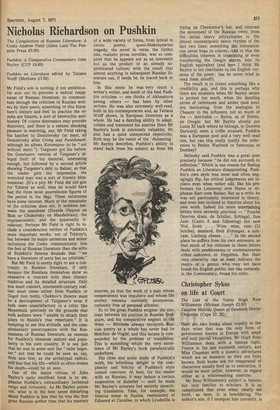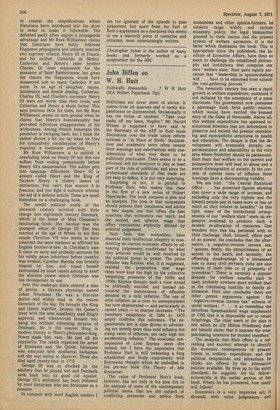Christopher Sykes on life at Court
The Last of the Valois Hugh Ross Williamson (Michael Joseph £2.00) Caroline Matilda Queen of Denmark Hester Chapman (Cape £2..25) Here are two books about royalty in the days when that was the only form of government known in Europe with small and only partial exceptions. Mr Hugh Ross Williamson deals with a famous topic, France in the late sixteenth century, and Miss Chapman with a queen's adventures which are as dramatic as they are little known. Both books ask for reappraisal of characters usually held up to execration. It would be most unfair, however, to regard either as a whitewashing exercise.
Mr Ross Williamson's subject is famous hut only familiar to scholars. It is so complicated that even when clearly set forth, as here, it is bewildering. The author's aim, if I interpret him correctly, is to combat the simplifications which historians have introduced into the story in order to make it followable. The defeated party often enjoys a propaganda advantage and Mr Ross Williamson claims that historians have lazily followed Huguenot propaganda and unfairly selected two supreme villains, Henry III of France, and his mother, Catherine de Medici. Catherine and Henry's elder brother Charles IX were responsible for the massacre of Saint Bartholomew, but given the chance the Huguenots would have massacred just as many Catholics if not more. In an age of slaughter, rapine, intolerance and double dealing, Catherine, Charles IX, and Charles's successor Henry III were not worse than their rivals, and Catherine and Henry a shade better. This says precious little for them, but Mr Ross Williamson seems on sure ground when he claims that Henry's homosexuality has provoked ridiculous exaggerations of his wickedness. Among French historians the pendulum is swinging back, but I think the author shoves a bit too far when he tries for sympathetic consideration of Henry's mignons, a loathsome collection.
Mr Ross Williamson is to publish a concluding book on Henry IV but this one suffers from ending prematurely before Henry III's assassination. The author gets into language difficulties. Henry III is always called Henri and the King of Navarre Henry, a clumsy means of distinction. You can't kiss anyone a to franoais, and you fight a outrance without the aid of a definite article. These are small blemishes on a challenging book.
The sordid political world of the sixteenth century survived with little change into eighteenth century Denmark, which is the scene of Miss Chapman's fascinating book. Her heroine was the youngest sister of George III. She was married at the age of fifteen to her first cousin Christian VII who seems to have inherited the same madness as afflicted his English brother-in-law. In Christian's case it came on early and probably accounts for his wildly gross behaviour before insanity was evident. Caroline Matilda was brutally treated by him, and found herself surrounded by court cabals aiming to exert the absolute power which Christian was too incompetent to use.
Into this snake-pit there entered a man of genius, a German physician named Johan Struensee. He was a first-rate doctor and widely read in the reform literature of the day. He brought the King and Queen together, became the Queen's lover with the now manifestly mad King's approval, and manoeuvred himself int(' being the brilliant reforming dictator of Denmark. He is the nearest thing in modern history to Plato's philosopher-king. Power made him vain. He lost all his popularity. The cabals organised the arrest of Struensee and the Queen. Struensee was executed with mediaeval barbarism and she was exiled to Hanover. There she died aged twenty-four in 1775.
George III was so shocked by the adultery that he played wet and Denmark sank back into its good old squalor. George III's sentiment has been followed by most historians who see Struensee as a monster.
In common with most English readers I am too ignorant of the episode to pass judgement, but apart from the Earl of Bute's appearance as a marquess this seems to me a masterly piece of narration and criticism, most entertainingly written.
Christopher Sykes is the author of many books and formerly worked as a scriptwriter for the BBC



































 Previous page
Previous page